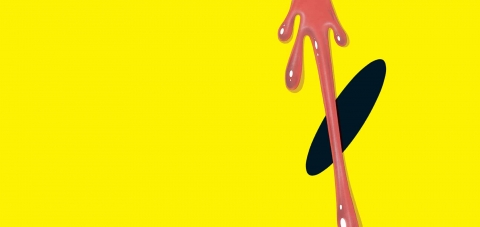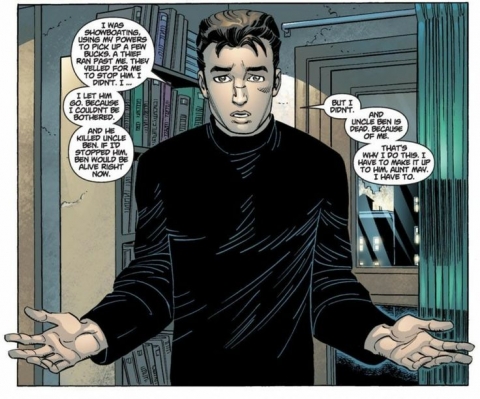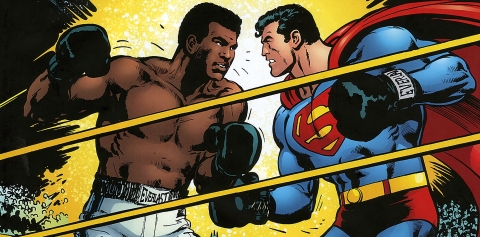52 weeks. 52 different writers. 2 trade paperbacks or hardcovers a week. Each week I’ll take a look at a different writer and read two different collected editions from within that person’s repertoire to help in the examination of their work. Garth Ennis takes center stage this week, bringing along his violent and twisted nature with him.
Garth Ennis is a unique type of writer who constantly manages to find the absolute perfect balance between over the top action/gore and gut-busting humour. He’s the style of writer who can flip the switch between the two different styles of writing at the drop of a hat and it’s always on display with the projects he undertakes. In my opinion, there is no such piece of work done by Ennis that better demonstrates his ability to write brutal, terrifying and yet somehow funny scenes than Preacher. Preacher is a great comic that blends western and religious themes together rather seamlessly, proving to at first be rather controversial before winning over fans and critics alike.
Preacher Volume 1
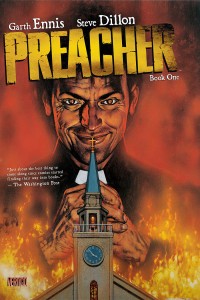 Preacher follows the tales of a man of God named Jesse Custer, a preacher in a small town of Texas who has a sick, gruesome past and a future that is maybe even more twisted. Jesse Custer is the host for Genesis, a divine entity that was birthed from the union between an angel and a devil. Tragedy strikes when Genesis combines with Jesse, with the end result being a manhunt for him involving the Texas police. As Jesse tries to elude the police he runs into his ex-girlfriend, Tulip, and an odd English man named Cassidy. Together the three characters dodge certain death and try to (literally) find God, who just so happens to have walked off the job following the creation of Genesis.
Preacher follows the tales of a man of God named Jesse Custer, a preacher in a small town of Texas who has a sick, gruesome past and a future that is maybe even more twisted. Jesse Custer is the host for Genesis, a divine entity that was birthed from the union between an angel and a devil. Tragedy strikes when Genesis combines with Jesse, with the end result being a manhunt for him involving the Texas police. As Jesse tries to elude the police he runs into his ex-girlfriend, Tulip, and an odd English man named Cassidy. Together the three characters dodge certain death and try to (literally) find God, who just so happens to have walked off the job following the creation of Genesis.
What makes Preacher such a rousing success as a piece of literary work is the fact that it brings something new to the table. Conceptually, Preacher is a wildly fascinating book, combining themes and genres that you’ve never really seen attempted in this way before. Preacher veers into such new and different ground that it’s hard to not be enthralled by the ideas that are constantly at play. Ennis takes an incredibly divisive topic like religion and spins it in a way that is not only interesting but also defers from swallowing the story whole. In most instances, it is nearly impossible to touch on something like religion without having it consume the entire narrative but in blending the idea of the “wild west” with the religious tone of the book, Garth Ennis strikes up a whole new style of storytelling for the western genre.
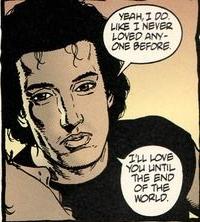
As stated in one of the intro paragraphs, Ennis just has a wildly different style of writing beyond what most casual readers would be used to. Every writer has their strengths and weaknesses, with Ennis’ strengths tied to his ability to blend seriousness, comedy and brutality together masterfully. Preacher is a story that will offend some, make others laugh, and deeply touch other people all around. It’s not surprising as you read the first few issues that people wrote this book off because of its shocking nature when it was first released, but when you look past some of the ridiculousness that’s occurring you see that this book has so much more going for it than just shock value and bizarreness. Ennis will go from a scene where a man dies because he was told to “go screw himself” (but with far more colourful language) and actually does it, to heartfelt moments shared between Jesse and his ex-girlfriend, Tulip. You’ll genuinely shake your head or say “I can’t believe they were allowed to do something so stupid in a comic” at some of the scenes while other scenes will have to reading it twice because of how strongly it is delivered. All around Preacher finds it’s balance between comedy and down right twisted beautifully.
Another thing Garth Ennis has shown to be quite adept at doing is creating distinct characters with unique quirks to set them all apart. No two characters are truly alike in this first collection whether it be Jesse Custer, a vulgar yet charming man of God, to Cassidy, an odd English bloke, to the Killer of Saints, a cowboy created to kill abominations like Genesis, or even John Tool, the exact opposite of the stereotypical African-American cop. Even characters like Grandma, Jody, Tulip, and even John frickin’ Wayne bring something different to the story. Each and every character is not only something new from the previous or future characters we’ve been introduced to, they also all talk in completely different manners. You’ve got it all from Cassidy’s English accent, Jesse’s southern drawl, John Wayne’s empathetic pronunciation of the word “Pardners” or even Arseface’s translated gibberish. Everyone has a different style of speaking and it’s beautifully on display every time a character opens their mouth.
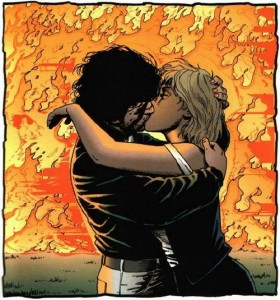
As far as the characters go, the fact that they’re all unique isn’t the only reason this story is great. The characters all matter to this story in some capacity as everyone seems to have a goal they’re striving towards or a secret they’ve yet to reveal. You grow attached to these characters because you become invested in what they’re doing. I genuinely meant it when I say that you care for just about every character you’re introduced because of the way Garth Ennis makes these characters go about trying to achieve their goals or overcome obstacles in their way. The secret surrounding why Jesse is the way he is and why he abandoned Tulip suddenly five years ago is just a classic Garth Ennis style of story, as he rips the heart out of your chest repeatedly and even takes a few instances to piss on your face for good measure. Jesse’s past is the primary example of hooking you into these characters lives (trust me, when I say Jesse’s story is a one heckava tale) but then as you discover other secrets or quirks, like why Tulip carries a gun or what is really up with Cassidy, and you can’t put this damn book down.
As always there is no such thing as a perfect body of work and Preacher does have a few moments that hurt it. It’s largest glaring weakness is that Garth Ennis doesn’t flesh out certain story beats enough or seemingly breezes over them. For example, the truth behind Tulip and why she carries a gun feels built up throughout much of the volume, only to get shortchanged to an off panel reveal that is then explained over a few pages. It makes sense why this was done, as Ennis uses it to speed up Jesse revealing his past and why he walked out on Tulip, but it is still unfortunate that it comes out so flaccid after a sufficient build up.
Collects: Preacher #1-12.
Best Character: Jesse Custer.
Best Line Of Dialogue/Caption: “You gotta be one of the good guys son, ’cause there’s way too many of the bad.” – John Custer.
Best Scene/Moment: Jesse judges the sinners – Issue 12.
Best Issue: Issue 8 – Where The Story Began, Issue 9 – How I Learned to Love The Lord. This is a first for me as I can’t make a choice between what the best issue in the collection was so I chose two instead. Issues 8 and 9 give the origin story of Jesse Custer and it is definitely a roller coaster of emotions. Cutting in between the past the present day, Ennis twists the knife time and time again by showing us the brutal life Jesse has experienced while in the present he anticipates awful events unfolding. The true punctuating mark occurs on the final page of issue 9 in a scene that just cripples Jesse and has a powerful final sentence.
Why You Should Read It: This series is a bright spot for comics from the 90’s. Widely considered one of the best Vertigo series ever produced, Preacher epitomizes what makes Garth Ennis such a great writer. It blends together humour, great stories centered on religion, western styles and some of the most twisted moments you’ll find in a comic book. Preacher satisfies the itch for something different on plenty of levels and it’s a comic everyone should at least give a chance at one time or another.
The Boys Volume 1: The Name Of The Game
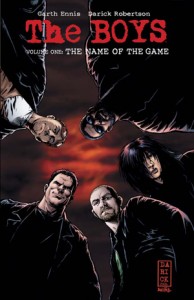 My original intent was to actually review the first volume of Garth Ennis’s Punisher Max run for today’s article but alas, sometimes weird things happen and stuff doesn’t pan out the way you intend. Having read a good handful of that run just on my own time, rest assured that it’s not only awesome but it feels like a travesty that I’m not talking about it today. But that’s alright because today is all about another awesomely violent and over-the-top series, The Boys. It’s funny to think that this series almost didn’t even make it off the ground, being cancelled after six issues by Wildstorm, an old DC Comics imprint. The publisher didn’t feel comfortable with the overall tone of the book and shortly after being cancelled, The Boys was picked up by Dynamite and enjoyed a quite healthy 77 issue run. Looks like Dynamite got the last laugh at the end of the day. Oh also, one of the characters is based on Simon Pegg, which is pretty funny.
My original intent was to actually review the first volume of Garth Ennis’s Punisher Max run for today’s article but alas, sometimes weird things happen and stuff doesn’t pan out the way you intend. Having read a good handful of that run just on my own time, rest assured that it’s not only awesome but it feels like a travesty that I’m not talking about it today. But that’s alright because today is all about another awesomely violent and over-the-top series, The Boys. It’s funny to think that this series almost didn’t even make it off the ground, being cancelled after six issues by Wildstorm, an old DC Comics imprint. The publisher didn’t feel comfortable with the overall tone of the book and shortly after being cancelled, The Boys was picked up by Dynamite and enjoyed a quite healthy 77 issue run. Looks like Dynamite got the last laugh at the end of the day. Oh also, one of the characters is based on Simon Pegg, which is pretty funny.
In a world where superheroes are becoming more and more common, who mediates these superhuman beings? Enter The Boys, a ragtag team of humans backed by the CIA who come together to knock the heroes of the world down a few pegs. Wee Hughie sparks the reconnection of the team when his girlfriend is killed as the result of a superhero battle. Distraught over the death of his girlfriend, Hughie is offered a spot amongst The Boys by Billy Butcher, the leader of the team. Assembling together the old team of Mother’s Milk, The Frenchman, and The Female, The Boys set out to show the heroes that regular humans can still take care of themselves
The classic comic question posed by Alan Moore many years ago was “Who watches the Watchmen?” and The Boys is Garth Ennis’ attempt at answering that question in his own twisted way. This first volume of The Boys has everything people love about Ennis’ style, all crammed neatly into just six chapters of a long running story. There’s gratuitous violence, sex, cursing, vulgarity, and weirdness that all comes on so thick throughout this collection. Every page seems to feature one jaw dropping moment to the next, just when you think Garth Ennis can’t get any more sick with what he’s doing he manages to come up with a way that makes you shake your head yet still have a sideways smile because it’s all so outrageous that you just can’t help but laugh.
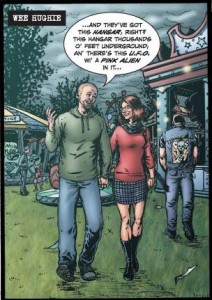
The levels of depravity that Ennis displays on behalf of some of these heroes is more scandalous than next week’s celebrity headline from some gossip website. This book is all a parody of the superhero genre, making sure to never take itself too seriously. The young team of heroes featured in this collection, Teenage Kix, are just a spoof of the Teen Titans, throwing in lookalikes of popular superhero characters like Nightwing, Beast Boy, Kid Flash, Arsenal and even a randomly placed Cyclops. Ennis takes the idea of young heroes without true moral compasses and displays how these characters truly act outside of the spotlight after a big victory. He up plays the social oddities and quirks of these superhuman characters and how a celebration for them is like the craziest party you’ve ever been to multiplied by a millions. To an even further and more disturbing point, Ennis displays a group called The Seven, as your Justice League archetype, showcasing a chilling side to what being a super team is all about. The way this group interacts with its newest member is revolting but in some sick way makes sense because of the dominance these characters feel over people who are “below” them due to their powers. Ennis essentially plays around with the old saying “absolute power corrupts absolutely” but in a bit of a clever way as he shows how these characters only really show a lack of responsibility when they think that no one is watching.
Ennis juggles a solid core cast with some fun secondary characters that help to round out the entire ordeal. Your core five characters are the members of The Boys: Billy Butcher, Wee Hughie, Mother’s Milk, The Frenchman, and The Female. Other characters like Starlight, Ms. Rayner, and even Homelander are all great additional characters that don’t play a huge role in this volume but will clearly have elevated roles going forward. Wee Hughie is the primary character that the reader follows along with for this story, as Ennis wisely uses him as a way to introduce us to most of the characters for the first time. For the most part, when Hughie first meets a character, it is also the reader’s first time meeting this character, allowing the reader to connect with Hughie on a more personal level due to the fact that you can relate with his new experiences. What’s great about the character of Hughie is how genuine he appears, he is so human and easy to relate to because of his indecisive nature. He’s a cowardly fellow who is wrapped up into something that is so much bigger than he is and isn’t even really sure if he wants to be a part of it. It’s a great deal of fun to watch how Hughie awkwardly adjusts to every problem thrown his way and still seems to stick around to see what boils up from the problems. Beyond Hughie not many other character gets fleshed out. There are hints of history between many of the characters and we get a small glimpse into the life of Billy Butcher but other than that there isn’t much occurring in the character development department. It’s obvious that Ennis is holding back some of his best stories for the later volumes, especially when it comes to establishing why the members of The Boys are the way they are.
Being that the story is set around several English characters, Ennis does a solid job of making them all speak as such. The way the words are written and broken down, it’s easy to see and understand how each character enunciates their words. There’s a clear language difference between the two different styles of English speaking characters, placing many characters who are from places like England into conversations with characters from New York. It’s a fun contrast that is easy enough to differentiate and makes the story more fun to read all because of simple minor details.
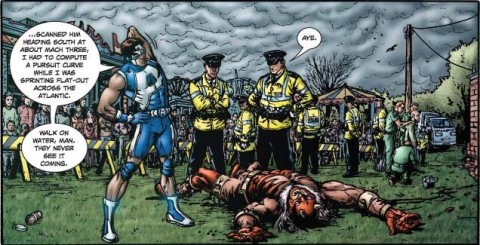
Collects: The Boys #1-6.
Best Character: Wee Hughie.
Best Line Of Dialogue/Caption: “You don’t play with matches if you don’t want to start any fires.” – Billy Butcher.
Best Scene/Moment: Wee Hughie and Robin at the carnival; Issue 1 – The Name Of The Game (Part 1).
Best Issue: Issue 2 – The Name Of The Game (Part 2). Issue 2 feels like the most solid issue of the lot as it brings the entire team of The Boys together. It’s a rather comedic outing that is low on action and high on talking but it never truly drags. There’s enough interesting things happening when it comes to introducing all the characters that the issue seems to fly by. It establishes many of the main characters as well as the story and truly sets off The Boys to be unlike any comic you’ll ever read.
Why You Should Read It: Garth Ennis crafts a different take on the anti-superhero movement that is bold, hilarious and chilling all at once. This isn’t your typical group of characters that are all out to cancel any heroes in action. Ennis delivers something that’s smarter than just constant gore, building up many of these characters to have larger roles going forward. It’s a brilliant example of how to set up the initial stages of a long form story.

